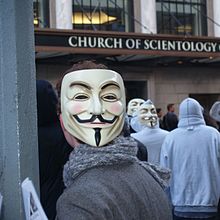This article needs to be updated. (December 2018) |
| Scientology and the Internet | |||
|---|---|---|---|
| Part of Scientology controversies | |||
 Counterclockwise from above: Protest by an Internet group calling itself 'Anonymous' against the practices and tax status of the Church of Scientology; Monument-style sign in front of the Founding Church of Scientology in Washington DC; Screenshot of error message when attempting to load www.scientology.org on January 25, 2008. | |||
| Date | July 1994 – present | ||
| Location | Internet, courts of law, worldwide protests | ||
| Methods | litigation, spam, trolling, astroturfing, street protests, prank calls, black faxes, denial of service attacks | ||
| Status | ongoing | ||
| Parties | |||
| |||
| Lead figures | |||

There are a number of disputes concerning the Church of Scientology's attempts to suppress material critical of Scientology and the organization on the Internet, utilizing various methods – primarily lawsuits and legal threats, as well as front organizations.[1][2][3] In late 1994, the organization began using various legal tactics to stop distribution of unpublished documents written by L. Ron Hubbard. The organization has often been accused of barratry through the filing of SLAPP suits.[4][5][6] The organization's response is that its litigious nature is solely to protect its copyrighted works and the unpublished status of certain documents.
Various critics of the Church of Scientology have characterized the organization as a confidence scam and say that these secretive writings are proof, or that they contain evidence that the organization's medical practices are illegal and fraudulent.[7][8] Scientology has been convicted of fraud in the courts of several nations, although not those of the United States. Others have said that the organization is abusing copyright law by launching lawsuits against outspoken critics.[9]
- ^ Critics split over DDoS attacks on Scientology The Register, 25 January 2008
- ^ Internet group launches War on Scientology, following YouTube video Canadian Content, 23 January 2008
- ^ Kent, Stephen A.; Krebs, Theresa (1988). "When Scholars Know Sin: Alternative Religions and Their Academic Supporters" (PDF). Skeptic. 6 (3): 36–44. Retrieved June 6, 2006.
- ^ Berry, Graham E. "How the Scientology Organization uses and exploits the United States' legal system for its own ends". FECRIS. Retrieved January 7, 2011.
The Pattinson v. Scientology case had to be dismissed when Scientology engaged in barratry and drove Michael Pattinson, and me, into bankruptcy.
- ^ Behar, Richard (May 6, 1991). "The Thriving Cult of Greed and Power". Time. Archived from the original on February 25, 2007. Retrieved January 7, 2011.
Hubbard warned his followers in writing to 'beware of attorneys who tell you not to sue... the purpose of the suit is to harass and discourage rather than to win.' Result: Scientology has brought hundreds of suits against its perceived enemies and today pays an estimated $20 million annually to more than 100 lawyers. One legal goal of Scientology is to bankrupt the opposition or bury it under paper.
- ^ Ortega, Tony (June 24, 2008). "Scientology's Crushing Defeat". The Village Voice. Archived from the original on July 9, 2008. Retrieved January 7, 2011.
In 1985, Scientologists filed a separate lawsuit based on federal anti-racketeering laws (a RICO action) in U.S. district court ... The federal court threw out the lawsuit ... calling it frivolous and 'bordering on malicious.'
- ^ Jacobsen, Jeff. Medical claims within Scientology's secret teachings, 1996
- ^ O'Connor, Mike. "How Scientology claims to cure physical illness", 2003
- ^ NOTS34: criminality successfully protected by copyright law, Tilman Hausherr (1998)
© MMXXIII Rich X Search. We shall prevail. All rights reserved. Rich X Search
